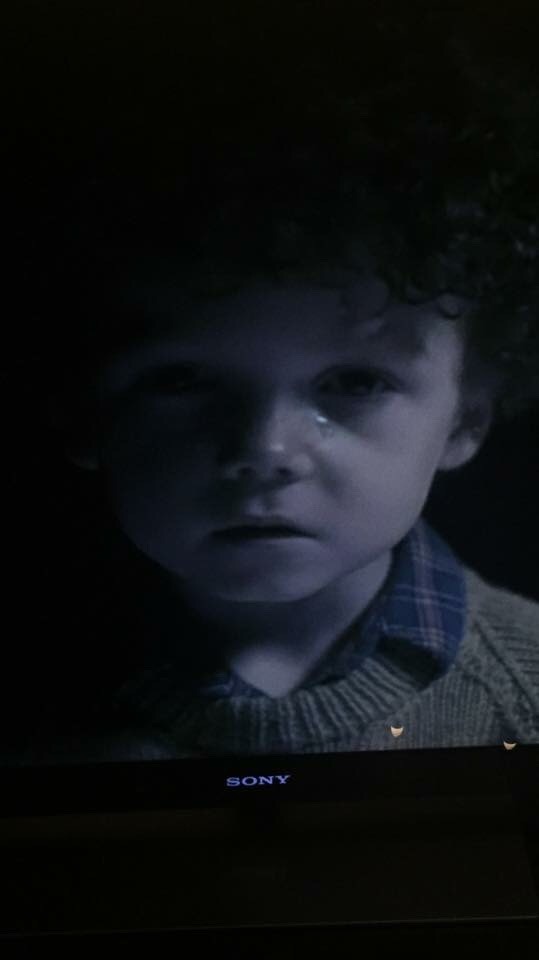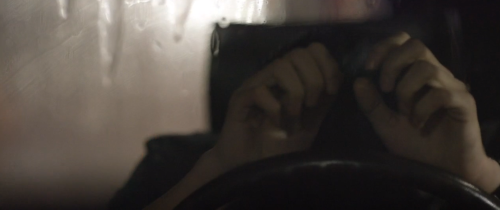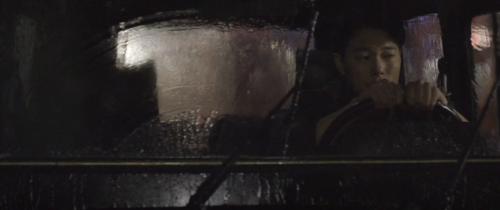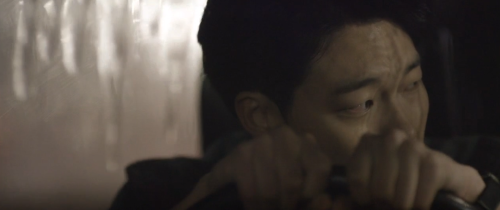Laughing Because
Laughing because
Here we have
• Sherlock texting Irene back

• Flying halfway across the world to take on armed terrorists to save her

• “Oh, but I will have the cameraphone, though.”

• “The Woman. THE Woman.”

• Just him imagining her in an extremely intimate and sentimental manner in the middle of a life-or-death situation, NBD. (And it’s made clear that this is not unusual.)

• “The Woman Will Cry”

• Irene as the very first of Sherlock’s pressure points:

• The red rose she sent or left Sherlock in his hospital room (red roses are symbols of ‘one true love’). The fact that he took it with him when he snuck out.

• Sherlock having a conversation with John about Irene’s importance to him in his Mind Palace, including the fact that he kept a picture of her in his pocket watch:

• Every single person involved with the show to any significant degree giving numerous quotes supporting Adlock.

• And of course, The Lying Detective, where it becomes canon that Sherlock kept her moan text alert five years and several phones later, and that he does indeed reply to her.

People who ship That Other Ship in her tags:
• “WhY is this ADlock being forced down our throats out of NOwhere?!?!?”
More Posts from Erkology and Others
I almost cried when Sherlock is about to shoot Mycroft. Almost



How To Start Conversation with MBTI Types
ESTP: ask them where to get the best offer for something
ESFP: ask them if they’re going to *insert a popular band’s next concert*
ISTP: watch a gory movie, guess how they do the effects
ISFP: ask for song recs, ask their fav band and said band’s best song(s)
ENTP: scroll through 9gag/other meme page/mutual fandom tumblr tag together, then compare your headcanons
ENFP: ask, “Which movie(s) you’re definitely going to watch in cinema this year?”
INTP: ask them to explain one of the logical fallacy
INFP: self-inserts yourselves into a serial you both love
ESTJ: ask their help to assemble IKEA products
ESFJ: ask about work, their last holiday, anything, and/or tell them about your (crappy) day
ISFJ: invite them out to your gang’s get-together
ISTJ: ask tips to stay organized. Avoid too many small talks
ENTJ: discuss about your state’s/country’s/world politics. And politicians
ENFJ: talk about what you aim for in 5 or 10 years later.
INFJ: talk about whether euthanasia is morally right
INTJ: discuss ideologies. If you don’t know much, ask them to explain what Communism is and isn’t
RESTING BITCH FACE
To everyone who thinks I have a problem with you, don’t be so full of yourselves. I don’t give a fuck about you so don’t think that how I look like has something to do with you.
I just hope they do Sansa's storyline justice next season...because this girl belongs in winterfell. .with her family.. with Jon... with Bran...and with Arya.. They need to get together
I am seriously torn between two good things. Which one should I choose?
Are we not going to talk about how easily/coldly Sansa realized and accepted the fact that Rickon is going to die?
AWKWARD INTJ’S THOUGHTS #2
As we all have already established, INTJs work differently than other people. We are cold, rational and analytical. We are brutally honest, dislike humankind and don’t care about other’s opinions. We don’t like any involvement, feelings, or emotions. But despite that, we are all only weak, fragile humans. And even we have some fears, or face adversities. Don’t try to deny it. Everyone is afraid of something. Voldemort was afraid of dying, the Joker was afraid of being considered as a common clown, Sauron was afraid of the Ring being destroyed, Sherlock was afraid of John leaving him, Moriarty was… Well, I’m quite sure he was afraid of something, too. Sherlock has only three seasons, I’m slowly dying waiting for fourth, shut up. You know I’m right.

We all fear something or have to overcome adversity. Everyone experiences those in their own, specific way, but as always, INTJs’ way is the most specific. Let me explain it on me.
Five months ago I was diagnosed with social anxiety and depression. I started treatment, psychotherapy and other stuff that was supposed to help me. Today I made a decision. As I am terrified of using public transport and generally being in public, I decided that would be a big step for me to take a tram and just go, even if it was supposed to be five minutes ride. I did as I said. When I got out of the tram, I was expecting to feel something. Happiness. Relief. Pride. I didn’t feel any of those. I started my walk back home with my mind being completely blank. Until I got home. Then I felt it. I felt this overwhelming anger.

I was so angry at myself that I was so weak before. That I let myself be weak. That I let myself feel weak. That I let myself act weak. Because that, THAT, is the biggest humiliation for INTJ. To show feelings, to show fear and let the fear take control. Of course, fear is rational in certain situations. But most of the times, it’s not. And we don’t like irrational things. And we don’t like to feel out of the control. Oh, no, we really don’t like it.
We must remain strong, to feel confident. INTJs are those cold, silent, untouched people looking at everyone with their analytical gazes. And feeling anything, especially fear is a humiliation for us. You may say, that fearing something is human. You’re right. And INTJs are human, even if most of times we seem INhuman. But we see and feel and act and react differently. In our own, specific way. And showing weakness, let alone asking for help, is the last thing we’d do. The same applies to adversities. We don’t want your help. Even if we’re falling, we don’t want you catch us. We want you to leave us alone, so we can do it on our own. That’s what how we are.
Cold. Rational. Analytical. Untouched. And strong. Oh god, unbelievably strong.

Contributor
Two major types of INTJ
One of the most interesting things I read in relation to personality theory was Cognitive Styles. It is completely separate personality profiling system, but it can be used in conjunction with MBTI. And when you combine the two, you find out that there are two major types of INTJs
The ones that don’t wear a ‘social mask’ (perceiver INTJs)
The ones that do wear a social mask (contributor INTJs)
There are other variations, but these are the most common. Out of the two, the perceiver INTJ’s are the most common. Contributor INTJ’s (I am one of these) often feel out-of-step within the community, because they are always wearing some form of public mask, and always playing the social game, whereas their INTJ perceiver peers denounce such things.
Perceiver INTJs
Hate social games, and usual rebel when possible and do their best to not comply.
They don’t respect authority at all unless its proven itself, and even then, they are forever skeptical.
They have a strong moral compass, and they follow it. They have a very, very strong sense of justice. Pretending to be someone else, i.e. wearing the “social mask” feels dirty, because it is deceptive and not who they really are.
While most like things, they are less concerned with material matters.
They do not care what society thinks of them.
Contributor INTJs
Contributor INTJ’s do care about what society thinks of them. They wear lots of social masks, and they usually wear them well. They play the social game, and they usually do this without being bitter about it (even if it makes them tired).
They key to understand why they do this, is that they are inherently pragmatic. Socializing is often not natural for them but they learn the skills because it pragmatically assists them in achieving their abstract goals. They don’t have an inherent drive to be liked for the sake of being liked, but they want to achieve their goals.
They care more about possessions because things help them get other things; contributor INTJ’s do well in sales and business.
Respect authority more because they take-on social roles when it is necessary.
Because they are incredibly goal-based, their morals tend to be weaker. They are more likely to blur the lines. They will do things to get ahead. Unlike the perceiver INTJ who doesn’t like to lie about who they are (even if it means achieving their goals will be harder), the contributor will “wear the mask”.
Which type are you?




“In the end, fate and destiny do not just happen out of coincidence. They are products of earnest, simple choices, that make up miraculous moments. Being resolute, making decisions without hesitation, that is what makes timing. He wanted her more than I did, and I should have been more courageous. It was not the traffic light’s fault. It was not timing. It was my many hesitations.”
-
 booksoversleep liked this · 2 years ago
booksoversleep liked this · 2 years ago -
 cnaeger17 liked this · 3 years ago
cnaeger17 liked this · 3 years ago -
 inexpressiblybeautiful liked this · 3 years ago
inexpressiblybeautiful liked this · 3 years ago -
 diode-book liked this · 3 years ago
diode-book liked this · 3 years ago -
 cora-trash-art liked this · 3 years ago
cora-trash-art liked this · 3 years ago -
 poepower liked this · 3 years ago
poepower liked this · 3 years ago -
 anacartola liked this · 3 years ago
anacartola liked this · 3 years ago -
 alwaysnfk reblogged this · 3 years ago
alwaysnfk reblogged this · 3 years ago -
 alwaysnfk liked this · 3 years ago
alwaysnfk liked this · 3 years ago -
 the-one-woman-that-matters reblogged this · 3 years ago
the-one-woman-that-matters reblogged this · 3 years ago -
 the-one-woman-that-matters liked this · 3 years ago
the-one-woman-that-matters liked this · 3 years ago -
 ahnallah-blog liked this · 4 years ago
ahnallah-blog liked this · 4 years ago -
 larakoprivec reblogged this · 4 years ago
larakoprivec reblogged this · 4 years ago -
 f0rgetab0utit liked this · 4 years ago
f0rgetab0utit liked this · 4 years ago -
 there-s-no-love reblogged this · 4 years ago
there-s-no-love reblogged this · 4 years ago -
 there-s-no-love liked this · 4 years ago
there-s-no-love liked this · 4 years ago -
 thewisewhitewolf liked this · 4 years ago
thewisewhitewolf liked this · 4 years ago -
 transparentfuntimemachine reblogged this · 5 years ago
transparentfuntimemachine reblogged this · 5 years ago -
 transparentfuntimemachine liked this · 5 years ago
transparentfuntimemachine liked this · 5 years ago -
 abigailroseglow liked this · 5 years ago
abigailroseglow liked this · 5 years ago -
 siy21 liked this · 5 years ago
siy21 liked this · 5 years ago -
 lisa-bella1170 liked this · 6 years ago
lisa-bella1170 liked this · 6 years ago -
 niquedich liked this · 6 years ago
niquedich liked this · 6 years ago -
 nocturnaleworld liked this · 6 years ago
nocturnaleworld liked this · 6 years ago -
 adarnalways liked this · 6 years ago
adarnalways liked this · 6 years ago -
 rosemary-w liked this · 6 years ago
rosemary-w liked this · 6 years ago -
 erimaaaaa liked this · 6 years ago
erimaaaaa liked this · 6 years ago -
 looks-like-hell liked this · 7 years ago
looks-like-hell liked this · 7 years ago -
 foodiesenpai liked this · 7 years ago
foodiesenpai liked this · 7 years ago -
 professional-roaster reblogged this · 7 years ago
professional-roaster reblogged this · 7 years ago -
 ellieoldme reblogged this · 7 years ago
ellieoldme reblogged this · 7 years ago -
 elisewithonel liked this · 7 years ago
elisewithonel liked this · 7 years ago -
 some-random-shttt reblogged this · 7 years ago
some-random-shttt reblogged this · 7 years ago -
 some-random-shttt liked this · 7 years ago
some-random-shttt liked this · 7 years ago -
 battledress liked this · 7 years ago
battledress liked this · 7 years ago -
 deuslexlmachina liked this · 7 years ago
deuslexlmachina liked this · 7 years ago -
 slayqueenflawless-blog reblogged this · 7 years ago
slayqueenflawless-blog reblogged this · 7 years ago -
 slayqueenflawless-blog liked this · 7 years ago
slayqueenflawless-blog liked this · 7 years ago -
 more-agathario-pls liked this · 7 years ago
more-agathario-pls liked this · 7 years ago -
 kassandraparker liked this · 7 years ago
kassandraparker liked this · 7 years ago -
 wxnglesscastiel liked this · 7 years ago
wxnglesscastiel liked this · 7 years ago -
 oogle-doogle liked this · 7 years ago
oogle-doogle liked this · 7 years ago -
 rainy0627 reblogged this · 7 years ago
rainy0627 reblogged this · 7 years ago -
 maisies-and-daisies liked this · 8 years ago
maisies-and-daisies liked this · 8 years ago -
 its-sentimental-adlock-blog liked this · 8 years ago
its-sentimental-adlock-blog liked this · 8 years ago -
 purplelover188 reblogged this · 8 years ago
purplelover188 reblogged this · 8 years ago -
 d4-128 liked this · 8 years ago
d4-128 liked this · 8 years ago